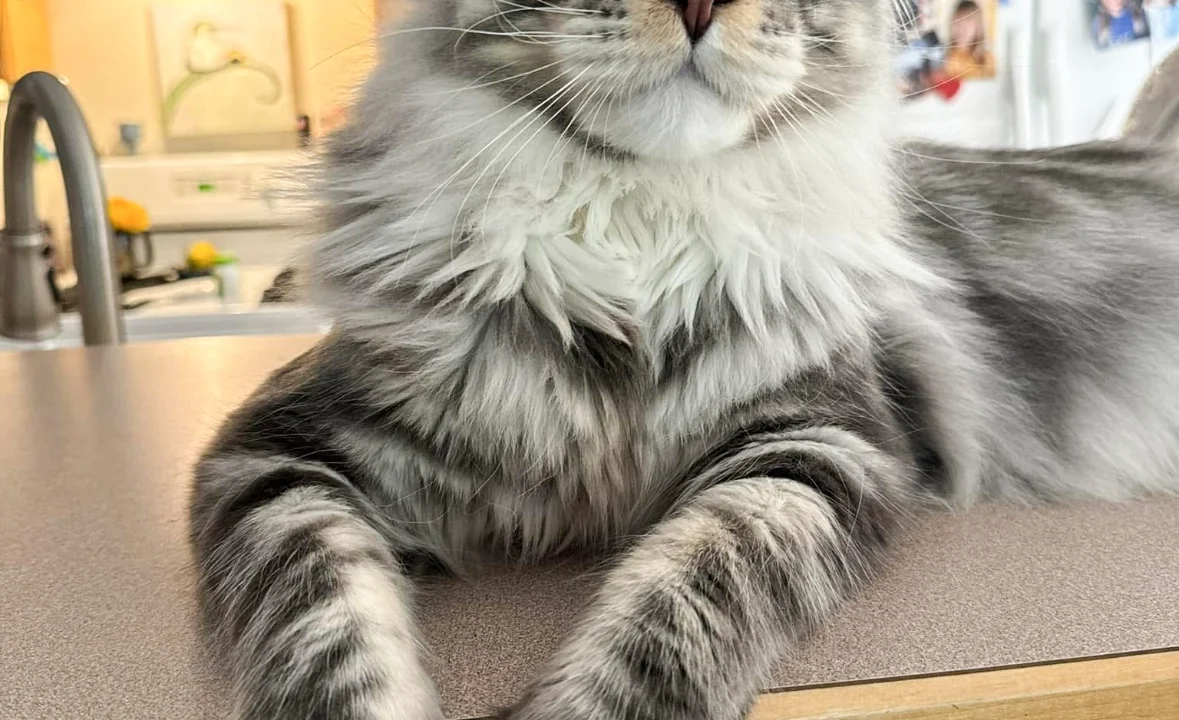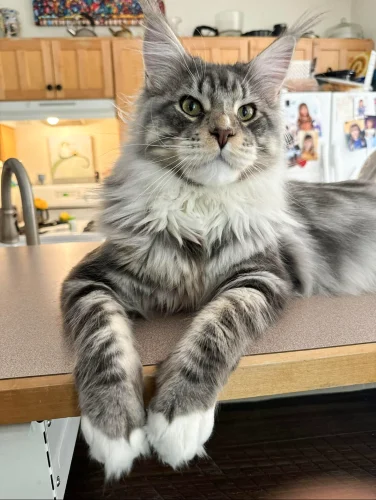Maine Coon Nasal Issues


Nasal issues in Maine Coons are pretty standard, and some can lead to serious health complications for your cat. Continue reading to learn how to recognize these problems.
Nasal Issues in Maine Coons
Although Maine Coons are known for their resilience, they can experience various nasal issues due to the sensitivity of their nasal passages and upper respiratory tracts.
They are prone to conditions such as:
- Feline rhinitis
- Sinusitis
- Nasal polyps
These nasal problems can cause significant discomfort for the Maine Coon and may impact their overall health. Bacteria, viruses, parasites, and fungi are the primary causes of nasal issues in Maine Coons. However, some problems might be due to nasal polyps or tumors within the nasal canal.
If your Maine Coon has a nasal disorder, it can lead to respiratory difficulties, and the stress from these issues can result in appetite loss, causing:
- Weight Loss
- Suppressed Immunity
- Dehydration
Here are some of the most common nasal issues in Maine Coons:
1. Feline Rhinitis
Feline rhinitis is a prevalent nasal issue in Maine Coons, causing considerable discomfort. Cats with this condition often become lethargic and less active.
Maine Coons with feline rhinitis tend to rest rather than play, and may also show symptoms such as:
- Loss Of Appetite
- Dehydration
- Weight Loss
Chronic feline rhinitis can lead to weight loss in Maine Coons, as the disease often lasts for months.
Symptoms:
Symptoms of feline rhinitis in Maine Coons include:
- Sneezing
- Occasional cough
- Watery eyes
- Nasal discharge (watery)
- Reverse sneezing (when the cat inhales forcefully to clear nasal discharge)
- Pawing at the mouth
- Retching
- Labored breathing
- Loss of appetite
- Restlessness
Causes
The causes of feline rhinitis in Maine Coons include:
- Viral infections like Feline Calicivirus
- Bacterial infections
- Fungal infections
- Parasites
- Allergies
- Neoplasia
- Foreign bodies
- Anatomical deformities (cleft palate)
Treatment
Treatment options for feline rhinitis in Maine Coons include:
- Antibiotics: Antibiotics are typically given to treat bacterial infections, along with anti-allergic medications to alleviate symptoms like sneezing, and sometimes IV fluids if the cat is dehydrated.
- Nebulizing: Nebulizing can provide relief to Maine Coons with feline rhinitis. It is recommended to add a few drops of medications like aminophylline to the
- Nebulizer to offer a calming effect on the cat’s nose (source).
2. Sinusitis
Sinusitis is a prevalent nasal condition in Maine Coons. It involves inflammation of the sinus linings, which are hollow areas in the skull connected to the respiratory system and aid in breathing. Sinusitis can significantly affect a Maine Coon’s normal breathing and cause discomfort. There are various causes of nasal and sinus inflammation in cats, such as infections and environmental factors.
In Maine Coons, sinusitis may occur alongside rhinitis, a condition known as rhinosinusitis.
Symptoms
Symptoms of sinus infection in cats include:
- Sneezing
- Dyspnea (difficult breathing)
- Pawing at the face
- Snoring
- Runny nose
- Stuffy nose
- Facial pain
Causes
Causes of sinusitis in Maine Coons include:
- Bacterial infections
- Viral infections
- Fungal infections
- Allergies
- Anatomical defects in the sinuses
- Suppressed immunity
Treatment
Treatment for cat sinusitis includes:
- Antibiotics: Antibiotics can eliminate microorganisms causing the infection, especially bacteria.
- Painkillers and Anti-Inflammatories: Alongside antibiotics, analgesics, anti-inflammatories, and anti-allergy medications are administered to alleviate symptoms and provide relief.
3. Nasal Polyps
Nasal polyps are benign growths that usually form in the nasal passages of cats, but they can also appear in the ear canal or soft palate.
Nasal polyps consist of inflammatory cells encased by epithelial cells (skin cells).
Infections and inflammations can lead to nasal polyps in Maine Coons.
Although nasal polyps resemble the symptoms of an upper respiratory tract infection, they may not respond to typical treatments for such infections in cats.
Nasal polyps can extend into the throat, forming nasopharyngeal polyps, which can cause significant breathing difficulties for the cat.
They may also interfere with food intake.
Symptoms
Symptoms of nasal polyps in Maine Coons include:
- Sneezing
- Pawing at the mouth
- Nasal congestion
- Increased respiratory sounds
- Dyspnea (difficult breathing)
- Nasal congestion
- Snoring
- Open mouth breathing (if nasal passages are blocked)
Causes
Causes of nasal polyps in Maine Coons include:
- Infections
- Allergies
- Immune disorders
- Drug sensitivities
- Asthma
Treatment
Treatment methods for nasal polyps in Maine Coons include:
- Traction or Avulsion: Medications are rarely used for nasal polyps in Maine Coons; instead, traction or avulsion is performed. The veterinarian sedates the cat, gently grasps the polyp with forceps, twists it, and removes it.
- Laser Ablation: Laser ablation, using a laser beam, can also remove nasal polyps in Maine Coons, though it is a costly and uncommon procedure.
4. Nasal Parasites
Parasites can cause nasal problems in Maine Coons, although they are rare.
Maine Coons can be infected with two species of parasites (nematodes) from the Mammomonogamus genus in their nasal passages.
Infections from these parasites are usually asymptomatic, but mild symptoms may occasionally appear.
Nasal Bots or Bot fly larvae (Warble fly larvae) can also migrate into the nasal cavity, but this is extremely rare as Maine Coons are not typical hosts for these parasites. These parasites generally reside in the loose skin of the neck, but instances of them being found in the nasal canal of cats have been reported.
Symptoms
Symptoms of nasal parasites in Maine Coons include:
- Nasal discharge
- Nasal irritation
- Pawing at the mouth
- Red worms up to 1-2 cm long may be visible in the nasal discharge of your Maine Coon
Causes
Causes of nasal parasites in Maine Coons include:
- Nematodes of the family Syngamidae
- Warble fly larvae (Nasal Bots)
Treatment
Treatment strategies for nasal parasites in Maine Coons include:
Nasal Aspergillosis
- Nasal aspergillosis is a fungal infection affecting the nasal passages of Maine Coons. There are two types of nasal aspergillosis among cats, with sino-nasal aspergillosis (SNA) being the most common in Maine Coons.This fungal infection harms the cat’s fragile sinus bone structure.A “fungal ball or aspergilloma” may develop in the nasal passage due to mucus and fungus buildup.If the fungus enters the bloodstream through the respiratory system, it can spread throughout the Maine Coon’s body.
SymptomsSymptoms of nasal aspergillosis in Maine Coons include:- Inflamed, dry, and ulcerated nostrils
- Nasal discharge
- Occasional nosebleeds
- Sneezing
- Pawing at the face
- Rapid breathing
- Coughing
Causes of nasal aspergillosis in Maine Coons include:- Aspergillus spores, known as conidia
- Mold spores
Treatment for nasal aspergillosis in Maine Coons includes:- Sino-nasal aspergillosis is typically treated with systemic antifungal drugs like itraconazole, posaconazole, and amphotericin B.
- In some instances, topical intranasal 1% clotrimazole has been effective (source).
In Maine Coons, nasal tumors primarily develop in the paranasal sinuses and nasal cavities. Nasal tumors are cancerous, unlike nasal polyps.Squamous cell carcinoma (SCC), lymphoma, and carcinoma are the most prevalent nasal tumors in Maine Coons.
Symptoms
Common symptoms of nasal tumors in Maine Coons include:- Nasal discharge
- Loud snoring
- Bleeding from the nose
- Facial deformity (nose bump or asymmetrical face)
- Nasal discomfort and pain
- Seizures
Nasal tumors in Maine Coons can be caused by:- Genetic mutations
- Viral diseases
- Drug reactions
- Exposure to radiation
Treatment strategy for nasal tumors in Maine Coons includes:- Radiation Therapy: This is the standard treatment for nasal tumors in Maine Coons. It is preferred over surgery because nasal tumors often develop in confined areas. Unfortunately, radiation therapy can affect both healthy and cancerous cells (source).
7. Epistaxis (Nosebleeds)
Epistaxis, or nosebleeds, is a nasal condition that can affect Maine Coons.
This issue often arises from bleeding in the nostrils, nasal cavity, nasopharynx (the throat area behind the nose), or soft palate.
Symptoms
Symptoms of epistaxis in Maine Coons include:
- Bleeding from the nose (continuous or intermittent)
- Nasal pain
Causes
Causes of epistaxis in Maine Coons include:
- Toxicity or poisoning
- Nasal tumors
- Fungal infections
- Bacterial and viral infections
- Trauma or injury to the nasal cavity
Treatment
Treatment methods for epistaxis in Maine Coons include (source):
- Applying ice packs to the nose to control bleeding.
- Eliminating the cause of nosebleeds.
- Administering blood clotting drugs to manage severe bleeding.
8. Cryptococcosis
Cryptococcosis is a fungal infection that impacts the nasal cavity of Maine Coons when they inhale spores from a fungus found in soil or organic materials like decaying plant matter and bird droppings. Maine Coons can also contract this fungus if spores enter the bloodstream through open wounds on their bodies.
Symptoms
Symptoms of Cryptococcosis in Maine Coons include:
- Sneezing
- Firm swelling over the bridge of the nose
- Polyps in the nasal passages may lead to breathing difficulties.
- Nasal discharge (which can be clear, mucoid, bloody, or contain pus)
Causes
Causes of Cryptococcosis in Maine Coons include:
- Spores of Cryptococcus neoformans
- Spores of Cryptococcus gattii
Treatment
Treatment of Cryptococcosis in Maine Coons includes:
- Mild infections can be treated with fluconazole.
- For severe infections affecting the nervous system, amphotericin B (AMB) is recommended.
Treating Feline Nasal Congestion At Home
If your Maine Coon is experiencing nasal congestion, we can assist.
We have gathered a list of home remedies that might help alleviate nasal congestion in Maine Coons.
Increase Humidity
Use a humidifier or vaporizer near your Maine Coon, as increased humidity can ease nasal membrane irritation and reduce congestion. If a humidifier or vaporizer isn’t available, you can keep the cat in the bathroom while taking a hot shower to let it inhale the steam. However, ensure the cat remains dry.
Nebulize The Cat
Nebulizers can be utilized at home to aid Maine Coons with nasal congestion.
Adding a few drops of aminophylline to the nebulizer can help soothe the cat’s nasal membranes. Please consult your vet beforehand to confirm that this is appropriate for your cat’s specific health condition.
Cat Sinus Massage
A sinus massage may be helpful for cats with sinus issues.
Gently massaging certain areas on a Maine Coon’s face can help clear sinuses and nasal passages. One area is next to each nostril, and another is at the inner edge of the eye. Apply light pressure with your fingers for 5 to 10 seconds, repeating 2-3 times. Perform this on both sides of your cat’s face.
Provide Plenty Of Water
Ensure your Maine Coon has continuous access to fresh water. Proper hydration can greatly alleviate nasal congestion in cats.
Cat Runny Nose Home Treatment
A runny nose is a common issue in cats, including Maine Coons, so we’ve listed several simple home remedies below:
Plenty Of Rest
Ample rest is the most effective home treatment for a runny nose in Maine Coon cats. Ensure your cat stays indoors and avoids prolonged play, as physical activity can increase breathing and irritate the nasal cavity.
Nebulizing
Nebulizing opens the airways and softens the nasal membranes in Maine Coons.
This alleviates nasal discomfort and prevents discharges.
Saline Nasal Spray
Maine Coons with runny noses may benefit from an over-the-counter saline nasal spray. Do not spray directly into the cat’s nostrils; spray from a distance to avoid particles entering the lungs. Spraying once or twice daily can be effective.


